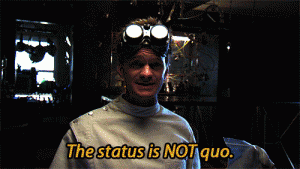Does the Status Quo Myth Hold Us Back? Part 1 of 2
Recent events, including Ferguson, the killing of Eric Garner, and the Black Lives Matter movement, have reminded many museums and museum professionals that we are situated in communities, and we need to figure out how to respond when our community is in crisis. For some, it’s not a reminder but a wake-up call. if you haven’t yet read the “Museums Respond to Ferguson” joint statement a number of voices in the field circulated a few weeks ago, I highly recommend it.
People have a natural tendency to believe that the way things currently are, the status quo, is the natural way for things to be. We also have a tendency to believe “if it ain’t broke, don’t fix it” and believe that the status quo implies that something is not broken. For a somewhat technical explanation, look at Wikipedia’s section on “Irrational Routes to the Status Quo Bias” within the Status Quo article and the economics and psychology articles cited there. This translates to believing that the way things are is not political. We see certain things in society as a baseline which exists because of human nature and not because people made choices that led to these things. **
Because museums and museum professionals fall into the trap of believing that the status quo is apolitical, it’s easy to avoid engaging with community issues. It appears to be the safe route. As Gail Ravnitzky Silberglied points out in the second chapter of Speak Up For Museums: The AAM Guide to Advocacy, many museum professionals incorrectly think that we can’t advocate on political issues because of our museum’s nonprofit status. Within the museum workplace, the myth of the apolitical status quo can prevent even hypothetical conversations about exhibitions or programming around tough issues. Young professionals especially are taught that at work, you should avoid any topics you wouldn’t talk about at an extended family dinner, like religion, your love life, or politics. It’s solid advice, but it’s possible some of our caution is misplaced. We shouldn’t be afraid to “talk politics” if we can leave our party affiliations at home. Community issues happen around our museums whether we engage with them or not.
In Part 2 of this post, I’ll explore what museums and museum professionals may be able to do about this problem. For now, I’ll leave you with the first and probably only time I will illustrate a post on this blog with a GIF.
* To name a few:
- The International Coalition of Sites of Conscience
- The Museums, Politics, and Power project
- Plus, countless blog posts, conference sessions, and more have excellent advice.
** Since I teach field trips about Boston in the American Revolution, I’ll use it as an example. Opponents of the American Revolution accused Patriots of stirring up trouble and being disloyal to English government. They argued that English subjects inherently owed a duty of respect to the King and Parliament. Patriots, on the other hand, argued that deference to the British government was not part of the natural order. Thomas Paine wrote, “There is another and great distinction for which no truly natural or religious reason can be assigned, and that is the distinction of men into KINGS and SUBJECTS.” Yet many loyalists would not have described themselves as taking a political stance. They felt they were just being good subjects.
